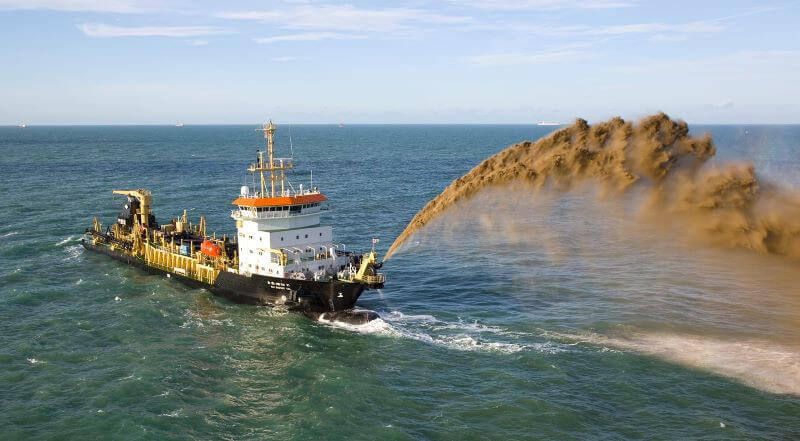Sea sand export is permitted again through new government regulations. The public and environmentalists are critical of this policy. Environmental, social, and economic destruction is waiting for us again.
The recent decision to reinstate the sea sand export permit, after a 20-year ban surprised and concerned due to its perceived lack of alignment with pro-people and environmentally conscious policies. Why does the government permit this activity?
The Startling Sea Sand Mining Policy

The controversial policy again allows sea sand exports. It is regulated in Government Regulation No. 26 of 2023 concerning the Management of Sedimentation Products in the Sea. In article 9, it is clearly stated that marine sediments that can be utilized are sea silt and sand. Sedimentation may be used for domestic reclamation, government infrastructure development, business facilities and infrastructure construction, and export only if domestic needs have been met.
The establishment of the policy raises many questions due to the lack of transparency in explaining the real location and need for sea sand. In the B-TALK interview conducted by KOMPAS TV (06/06), Victor Gustaf Manopo as the Director General of Marine Spatial Management at the KKP gave his explanation.
“Further research results will determine the precise quantity of sea sand required and its potential in Indonesia. This holds true for identifying specific locations authorized for sedimentation utilization as well.”
This statement makes us wonder, how could the government issue this policy before there is certainty about concrete needs, potential, and locations for dredging sea sand.
The Truth of Sea Sand Mining

Before we learn more about this issue, let’s move backward to explore the history of sea sand mining banned since the reign of President Megawati Soekarnoputri.
In the beginning, sea sand became one of the most promising commodities for export abroad. Many countries need sea sand for reclamation and land area expansion. One of them is Singapore, which is the biggest importer of sea sand in the world.
Indonesia has excellent sea sand potential, we exported it to Singapore. As a result, various environmental, social, and economic problems affect the coastal people. Marine ecosystem destruction causes fishermen to lose their livelihoods. Reduced sea sand also narrows down the coastline, affects wave height, and drowned 2 small islands in the Kepulauan Riau.
How pitiful, when neighboring countries are expanding their territory with our sand, we are losing marine ecosystems, the welfare of fishermen, and valuable islands. Although, we also gain profits enjoyed by some of the elite.
To close this dark history, the government banned the export of sea sand which was included in the Decree of the Minister of Industry and Trade Number 117/MPP/Kep/2/2003 concerning Temporary Suspension of Sea Sand Exports.
Sea Sand Mining Controversy

Even though sea exports have been banned, sea sand mining continues. The government continues to allow mining for domestic purposes such as construction and overcoming silting of shipping lanes. However, meeting domestic needs also causes environmental, social, and economic problems.
Damage to marine ecosystems occurs in divers problems. Sand mining will damage coral reefs as homes and places for fish to find food. As a result, many fish will die and leave the mining area. Furthermore, mining also has the potential to exacerbate coastal erosion. If abrasion continues, small islands are threatened with sinking.
Environmental impacts that occur will automatically affect the quality of life of coastal communities. They will lose their livelihood and shelter. The loss of fish in mining areas forces fishermen to sail farther than usual. In fact, the catchment obtained is not necessarily better. Their income from fishing is decreasing and making them difficult to fulfill daily needs.
The coastal people will also lose their homes. Their homes possibly will be drowned by seawater. Then, they will be dropped out to leave their hometowns.
Concerns about the impact that has arisen trigger many environmentalists to criticize this policy. So, what do you think about this? Do you agree with this policy?





